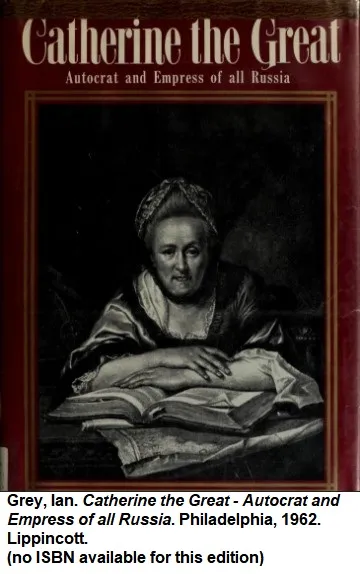Jeez Laweez... ANOTHER Bio of Catherine?!
"Alright Patriam, how many biographies of Catherine the Great are you going to review anyway?"
You remember that scene in Pirates of the Caribbean where Elizabeth asks Will how many times she has to tell him to call her 'Elizabeth' instead of 'Miss Swann' and he answers "always one more?"
...
...I'm kidding. This is actually going to be my last one for a while. I set out on a mission at the beginning of this year to learn as much as could be learned about this empress (being passionately in love with a woman sharing her given name, Ekaterina, who I was forced to part with at the beginning of the year, and having a touch of both sentimentality and superstition may or may not have been part of the impetus for this), and I've done precisely that. But after reading biographies by Virginia Rounding, Henri Troyat, Robert Massie and now Ian Grey (as well as a translation of Catherine's memoirs which I will not bother reviewing), I think I have read enough about the woman who was born Sophie of Anhalt-Zerbst, for a while at least.
...
...Next I'll move on to her principle lover, Grigory Potemkin.
Obsessed? Who, me?
ANYway, let's get down to it.
No Frills
I dove straight into this one on the same day that I put down what I have jokingly dubbed "Robert Massive's biography of Catherine (if you read my review of it you'll understand where the joke comes from), and that's fitting because these two stand almost as perfectly as foils for each other as Rounding and Troyat's biographies did. Whereas Massie seemed to be unable to decide what was important enough to be included and what was not, leading him to simply cram every minute fact he could find into a book so big it has its own area code, Grey seems to have had the most unforgiving pair of editing sheers I've seen yet. And whereas Massie, as his title suggests, was more concerned with Catherine the lonely, sensual and at times sentimental woman, Grey was solely and exclusively concerned with Catherine the empress. The attitude right from the downbeat is "I don't care about her personal life; let's discuss her reign."
Catherine's (or at this point perhaps we should say "Sophie's") early life, from her birth in a tiny German principality to her confirmation in the Russian Orthodox Church as Catherine Alexeyevna in preparation for her wedding, altogether, gets a mere 11 pages of coverage. Afterward, the reader is given 9 pages of background information about Elizabethan Russia (the setting into which Sophie/Catherine was thrown) and then, on page 37 (the same page number where Troyat was only just getting around to describing the awkward betrothal to Peter III), the chapter describing the birth of Paul (her son by Sergei Saltykov - it is believed) begins.
The book is so unconcerned with Catherine's personal life that it is the one biography I've yet read that does not even bother giving a list of her "favorites," the term used for the neverending parade of male Consorts Catherine had. In fact, more than simply skipping over a list, very few of them are even mentioned. Orlov and Potemkin both feature heavily (for indeed, how could they not?), and Zavadovsky and Zubov are mentioned (p. 182, 204, 229 & 243), Rimsky-Korsakov gets a name-drop (183), and Vassilchikov gets the unfortunate distinction of having an entire subchapter devoted to how his uselessness in state affairs set the stage for the rise of Potemkin. The others are notable in their absence.
In place of the juicier details of Catherine's personal life, this book focusses entirely on the impact of Catherine's reign upon Russia itself, and how this changed Russia's place on the world stage. Pages 136 and 216, for example, give summaries of the foreign policy doctrines that defined her empire's diplomacy both before and after "Potemkin's War (1787 - 1792)" against Turkey. While other biographers describe the events manifested by this policy, Grey writes the way one of George Friedman's analysts would: assembling the various events into a few succinct sentences and summarizing trends.
No Sugar-Coating
More than any other biographer I've read, including Troyat, Grey is unabashed in his appraisal of Catherine's "enlightened" status as an utter publicity stunt, designed (much like modern China's flamboyant self-praise for their supposed "poverty relief" efforts) to win acclaim from uninformed audiences in Europe. And (much like the Chinese propaganda to which it is compared) it worked.
The grand commission [of the Nakaz] had failed utterly as a legislative body, but it had served Catherine's purpose, which was to strengthen her position on the throne by gestures of reform and to claim the applause of the civilized world. (p. 149)
During the early sessions of the commission, when the deputies were pondering the elevated sentiments of the Nakaz... Catherine quietly and without publicity adopted a new ukaz, submitted to her by the Senate. This ukaz condemned to the knout and exile with hard labor for life any peasant who petitioned or complained against ill-treatment at the hands of his landowner. (p. 151)
Though no less impressed with Catherine's geopolitical achievements than Rounding or Massie, Grey does not pull his punches regarding the life of the Russian serf, which was made even more bitter under the perpetually heavier yoke of the emboldened landlord class in Catherine's reign.
No Extras
In the final analysis, calling this a "biography" might be a bit of a misnomer, as the star of the book is not really Catherine but Russia itself, in the time of Catherine. This book is, from the outset, very much a summary of a particular ruler's reign, not of their life (except insofar as those details impacted her reign). It doesn't tell as much about the woman herself as other biographies might, but as a history book describing the changes that took place in Russia, and in the world's attitude toward Russia, it's filled to the brim with the kind of information that makes a political science student's mouth water.
So Who Should Read It?
Well, simply put, if one's goal is to learn not really about Catherine the Great but about Russia itself, when it was one nation under Catherine, indivisible, the book is not a bad start. The author manages to keep his opinions mostly to himself (which was a welcome change after Troyat and Massie) and focus on facts, and no other biography cites so many of Catherine's Imperial Ukaz's as this one does, nor gives such detailed information on the contents of the Nakaz as examples of her policies.
In short, "here's a book about Russian history. If you like Russian history, you'll like this book."


